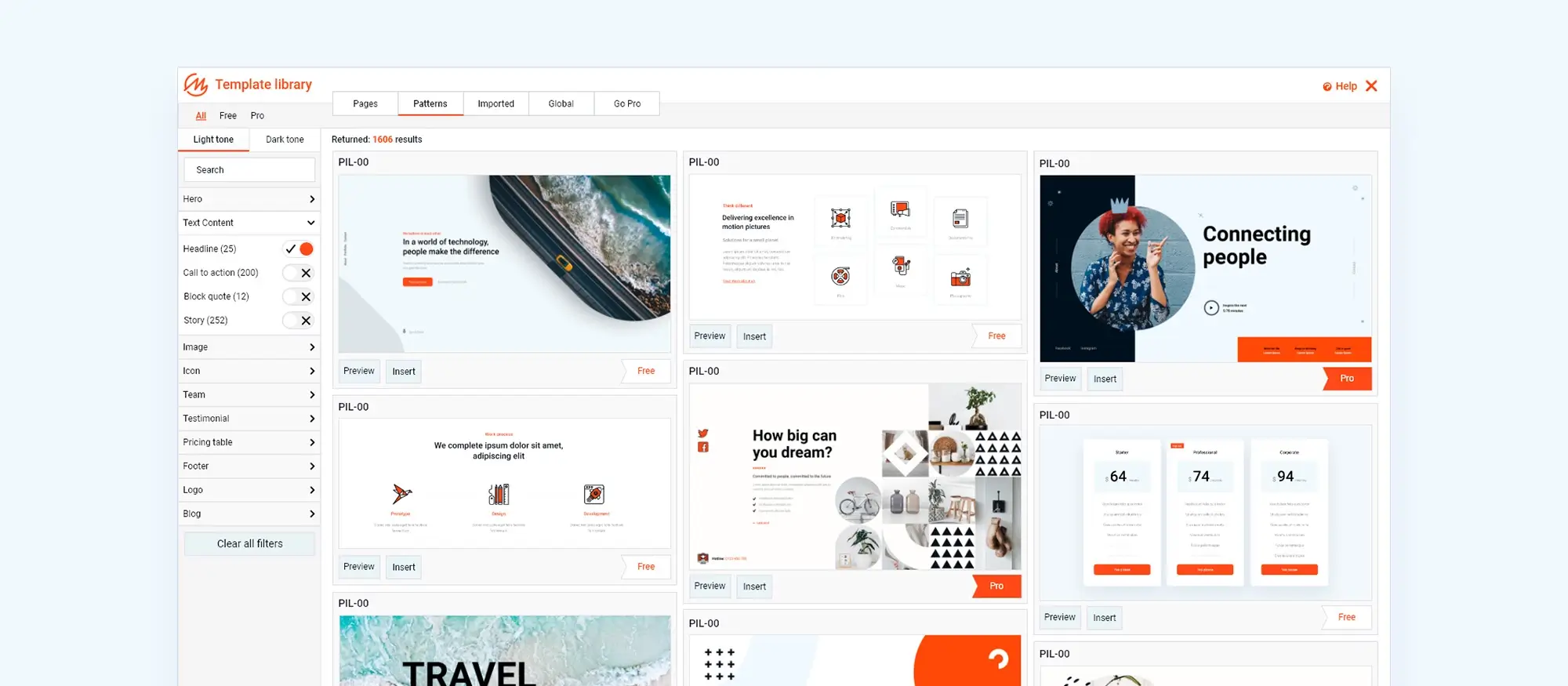20 things to consider with WordPress support
Try MaxiBlocks for free with 500+ library assets including basic templates. No account required. Free WordPress page builder, theme and updates included.

Updated 15th May 2025
Choosing the right WordPress support for your website
What to consider when selecting support services
Reliable support is a key part of managing a successful WordPress website. It’s not just about fixing errors it’s about ensuring stability, security, and performance over time. Whether you’re managing a business site or a personal project, understanding your support options can help you choose the right service for your needs.
Identifying your specific support requirements
The first step is to understand what kind of support your website actually needs. Some users may only need occasional help with updates or plugin issues, while others might require ongoing technical support for custom development or troubleshooting complex problems. Being clear about your needs helps you avoid overpaying for services you don’t use or underinvesting in support that’s essential.
Comparing managed and self-hosted WordPress
One important decision is whether to use managed WordPress hosting or manage the site yourself. Managed hosting includes built-in services such as automatic updates, backups, and dedicated support making it ideal for users who want a hands-off approach. Self-hosted WordPress gives you more flexibility and control, but it requires more involvement in technical maintenance. Consider your comfort level with site management when choosing between these options.
Assessing response times and reliability
How quickly a support team responds to issues can make a big difference, especially when your website is experiencing downtime or urgent problems. A good support service will offer clear response time expectations and follow through on them. Check what kind of response times are included in a support plan, and look for reviews or service level agreements that give insight into how responsive the team is in practice.

What to look for in reliable WordPress support services
Making informed decisions about support availability, communication, and expertise
Choosing the right WordPress support goes beyond basic troubleshooting. It’s about finding a service that’s responsive, knowledgeable, and well-equipped to meet your needs. Understanding the key aspects of support availability, communication methods, and technical expertise ensures you’re prepared to keep your website running smoothly at all times.
Considering support hours and availability
Support availability can vary significantly between providers. Some offer 24/7 help, which is ideal if your site serves a global audience or if downtime could impact business operations. Others may only provide support during standard business hours, which might be enough for smaller, less time-sensitive sites. Evaluate how critical your website is to your operations and choose a support plan that offers availability suited to your needs.
Reviewing available support channels
Support services differ in how they allow users to request help. Common channels include live chat, email, phone, and user forums. Each method has its strengths chat is often the quickest, email is better for detailed requests, and forums can offer insights from other users. It’s worth checking which channels are available and how effective they are in practice, especially for urgent or complex issues.
Checking the qualifications of support staff
Effective support depends on the expertise of the team behind it. Before choosing a provider, consider the technical skill level of their staff. Are they experienced with WordPress-specific problems? Do they understand custom themes, plugin conflicts, or performance optimisation? A knowledgeable support team is essential for resolving issues quickly and correctly, particularly for more complex sites.
Understanding how ticketing systems work
Many support teams use ticketing systems to track requests and manage workflow. These systems help ensure that issues are addressed in order and that nothing is overlooked. Knowing how to use the system such as submitting detailed descriptions and following up appropriately can make the process more efficient. Familiarity with the ticketing process also helps set realistic expectations for response and resolution times.
Subscribe to our newsletter
Key factors to assess when choosing WordPress support services
Balancing quality, coverage, and cost for effective website management
Reliable WordPress support is about more than fast responses it’s also about comprehensive resources, plugin compatibility, data protection, and value for money. Evaluating these areas helps ensure you’re selecting a support service that truly meets your needs and contributes to the stability and growth of your website.
Evaluating the quality of available documentation
Good documentation can save time and reduce reliance on direct support. User guides, knowledge bases, and FAQs allow you to troubleshoot common issues independently. When comparing support services, look for clear, well-organised, and regularly updated resources. This is a strong indicator of how much the provider invests in user support and how easily you’ll be able to solve minor problems on your own.
Ensuring support covers plugins and themes
Many WordPress issues stem from plugins or themes, especially when updates create compatibility conflicts. Not all support services cover third-party components, so it’s important to check if your provider includes help for the specific plugins or themes you rely on. This can prevent delays when issues arise and ensures a smoother experience when using custom features or integrations.
Looking at backup and recovery support options
Site backups and recovery tools are essential for protecting your content and minimising downtime. Some support services include automated backups, recovery assistance, or help restoring your site after a problem. Understanding what backup options are provided and how recovery is handled can give you confidence that your data is safe and that help is available if something goes wrong.
Assessing support costs and value
Support pricing varies based on the level of service, response times, and included features. Some providers offer basic plans at a low monthly cost, while others charge more for advanced, round-the-clock assistance. Consider what level of help you actually need and compare pricing models to ensure you’re getting value for money. Look for transparent pricing and clear descriptions of what’s included to avoid hidden costs or underwhelming service.

Considerations when selecting WordPress support services
Choosing comprehensive support that meets your technical, operational, and strategic needs
As you evaluate WordPress support providers, it’s important to look beyond the basics and consider factors like reputation, escalation protocols, third-party integration, and development expertise. These aspects ensure you’re not only getting reliable help for day-to-day issues but also access to advanced support when your site requires it.
Evaluating the provider’s reputation
A support provider’s reputation is one of the strongest indicators of their service quality. Look for user reviews, testimonials, and independent feedback to assess how responsive, knowledgeable, and dependable they are. A consistent track record of satisfied customers suggests that the provider is capable of handling a wide range of support needs effectively.
Understanding the escalation process
Not every issue can be resolved at the first level of support. That’s why it’s important to know how problems are escalated when they require more advanced expertise. A clear and structured escalation process means complex issues can reach the right technical staff quickly, helping avoid prolonged downtime or miscommunication.
Checking support for integrations with third-party services
Many WordPress sites rely on external tools like CRMs, email platforms, or analytics services. If your site uses these, confirm whether the support team is familiar with these systems and can assist when problems involve integrations. This saves time and prevents the need to contact multiple vendors when issues span different platforms.
Assessing help with security and compliance
Security threats and compliance requirements are ongoing concerns for website owners. Support services that include security reviews, vulnerability checks, or help with compliance standards (such as GDPR) can be incredibly valuable. Knowing you have access to expertise in these areas adds an extra layer of protection for your site and your users.
Considering available training and learning resources
Good support also includes opportunities to build your own knowledge. Training materials, tutorials, and live sessions can empower you to manage your WordPress site with more confidence. These resources reduce your reliance on support for everyday tasks and make it easier to handle routine updates or changes on your own.
Reviewing support for custom development and advanced features
If your site includes custom code or advanced functionality, you’ll need a support service that can work with these bespoke elements. Check whether the provider offers development-level support or is capable of troubleshooting issues related to custom themes, plugins, or APIs. For complex websites, this level of support can be essential for maintaining smooth performance and scalability.
Build like a pro
Checks when choosing WordPress support services
Ensuring consistent performance, proactive maintenance, and clear expectations
Selecting a reliable WordPress support provider involves evaluating more than just basic helpdesk availability. Services like performance optimisation, regular maintenance, and clear service agreements can have a lasting impact on your website’s stability and efficiency. Taking time to review these areas helps ensure that your support plan covers both current and future needs.
Evaluating support for performance optimisation
Site performance is critical for user experience and search engine visibility. Support that includes help with performance issues such as slow loading times, server optimisation, or plugin conflicts can keep your site running smoothly. Ask whether the support team assists with caching, image optimisation, or performance audits. This type of help can make a noticeable difference in how quickly and reliably your site operates.
Looking into ongoing maintenance support
Routine maintenance is essential for keeping your WordPress site secure, stable, and up to date. Ongoing support for maintenance tasks like updating plugins and themes, monitoring site uptime, and running backups can help prevent problems before they occur. Check whether your support plan includes regular checks and proactive monitoring, as this helps ensure long-term site health with minimal disruptions.
Reviewing the service level agreement (SLA)
A service level agreement defines the standards you can expect from your support provider. It typically includes details about response and resolution times, availability (such as 24/7 support), and what’s covered under your plan. Carefully reviewing the SLA ensures you understand the limits of the service and helps you hold the provider accountable if expectations are not met. It’s an essential reference point when evaluating whether the support aligns with your website’s operational needs.

Final thoughts and key takeaways
Choosing the right WordPress support is essential to ensure your website runs smoothly and efficiently. It involves evaluating factors like the type of help you need, the cost, and the quality of services available. By carefully considering these aspects, you can find the right support to meet your specific needs, whether it’s for design, security, or performance optimisation. The right support plays a crucial role in maintaining a high-functioning WordPress site.
If you’re looking for a versatile and user-friendly theme with powerful customisation options, consider exploring MaxiBlocks. This theme provides everything you need to create a professional website, with easy-to-use blocks and excellent flexibility. It’s an excellent choice for anyone wanting to take their WordPress site to the next level.
How to find good WordPress web designers – reliable, skilled and creative
If you’re looking to build a high-quality website, the right WordPress designer can make all the difference. Whether you’re working with a freelance WordPress designer or hiring through a WordPress web design studio, the key is to find someone who understands your goals and offers real value. You can start by learning how much WordPress website design costs and comparing that with insights on WordPress designer per hour pricing.
For those curious about the fundamentals, especially if transitioning from static sites, exploring how to create a website using HTML gives helpful context. It’s also worth reading about what makes a good WordPress web designer, so you know what qualities to look for. Once you’re confident in your brief, you can move forward and hire a WordPress designer with clarity.
Support doesn’t stop at launch. Post-launch WordPress support and regular maintenance are essential for keeping your site healthy. You might prefer to work with a full-service WordPress web design company or even a larger WordPress web design agency if you’re planning for future scaling. For the highest standards, exploring the best WordPress design options and choosing tailored WordPress design services can give your site the edge.
Performance and reliability matter too. Selecting the best website hosting for WordPress is just as important as choosing the right WordPress plugins. For a structured approach, follow the WordPress website designer guide and learn how to optimise WordPress SEO, use Google Analytics with WordPress and focus on optimising WordPress for better user experience and visibility.
Discover tools and layouts used by the best web designers
Explore expert tips, tools, and creative examples that define today’s best web designers.
FAQs – 20 things to consider with WordPress support
What does WordPress support typically include?
WordPress support often includes help with plugin and theme updates, website backups, security monitoring, bug fixes, performance optimisation and content updates.
Why is ongoing WordPress support important?
Ongoing support ensures your website stays secure, up to date, and functioning correctly. It helps prevent downtime, keeps things running smoothly, and allows you to focus on your business.
Is WordPress support available 24/7?
Some providers offer 24/7 support, especially if you opt for a premium plan. Others may have limited hours depending on their location and service agreement.
What should I look for in a WordPress support provider?
Look for a provider with WordPress expertise, clear communication, good response times, positive reviews, and a well-defined scope of services.
How much does WordPress support cost?
Prices vary depending on the level of service. Basic plans may start from £20 per month, while advanced support packages can go over £200 monthly.
Does WordPress support include emergency fixes?
Many support services include emergency support for critical issues like website crashes or security breaches, but it’s best to confirm this is part of your package.
Can I get WordPress support for just a one-time issue?
Yes, some providers offer pay-as-you-go or one-time support options for specific issues like plugin conflicts, errors, or minor updates.
Will WordPress support help with plugin conflicts?
Yes, resolving plugin conflicts is a common part of WordPress support. Providers will help identify the issue and find a compatible solution.
Does WordPress support include performance optimisation?
Many support packages include speed and performance checks, such as image optimisation, caching setup and database cleaning.
Can support providers help with SEO?
Basic SEO tasks like plugin setup and site health checks are often included. More advanced SEO work is usually a separate service.
Is WordPress support different from hosting support?
Yes, WordPress support focuses on your website’s software and content, while hosting support deals with server-related issues like uptime, bandwidth, and email hosting.
What happens if I stop paying for support?
If you cancel your support service, you’ll be responsible for managing updates, security and backups on your own, which can be risky if you’re not experienced.
Can I switch support providers easily?
Yes, but you should check your current contract for notice periods and ensure a smooth handover of credentials and access to your site.
Do support services cover custom-built sites?
Most providers will support custom-built WordPress sites, but it’s important to confirm they are comfortable with the custom code and setup.
Will support providers train me to use WordPress?
Some include training or tutorials to help you understand the basics of managing your WordPress site, while others focus solely on technical support.
Can I get help with content updates?
Yes, many support plans include assistance with adding or editing content such as blog posts, images and product listings.
Do I need support if I use a managed hosting provider?
Managed hosts offer some support, but it’s often limited to server issues. You may still need separate WordPress support for themes, plugins and content management.
What is the response time for support requests?
Response times vary depending on your plan. Some offer same-day support, while premium plans may promise responses within an hour.
Will support help me with hacked sites?
Yes, many support providers offer malware removal and security scans if your site is compromised, although this might come at an extra charge.
Should I choose a local or international support provider?
Both can be effective. Local providers may offer better time zone alignment and personal service, while international providers often offer 24/7 coverage and broader resources.
WordPress itself
Official Website
wordpress.org – This is the official website for WordPress, where you can download the software, find documentation, and learn more about using it.
WordPress Codex
codex.wordpress.org/Main_Page – This is a comprehensive documentation resource for WordPress, covering everything from installation and configuration to specific functionality and troubleshooting.
WordPress Theme Directory
wordpress.org/themes – The official WordPress theme directory is a great place to find free and premium WordPress themes. You can browse themes by category, feature, and popularity.
maxiblocks.com/go/help-desk
maxiblocks.com/pro-library
www.youtube.com/@maxiblocks
twitter.com/maxiblocks
linkedin.com/company/maxi-blocks
github.com/orgs/maxi-blocks
wordpress.org/plugins/maxi-blocks

Kyra Pieterse
Author
Kyra is the co-founder and creative lead of MaxiBlocks, an open-source page builder for WordPress Gutenberg.
You may also like

